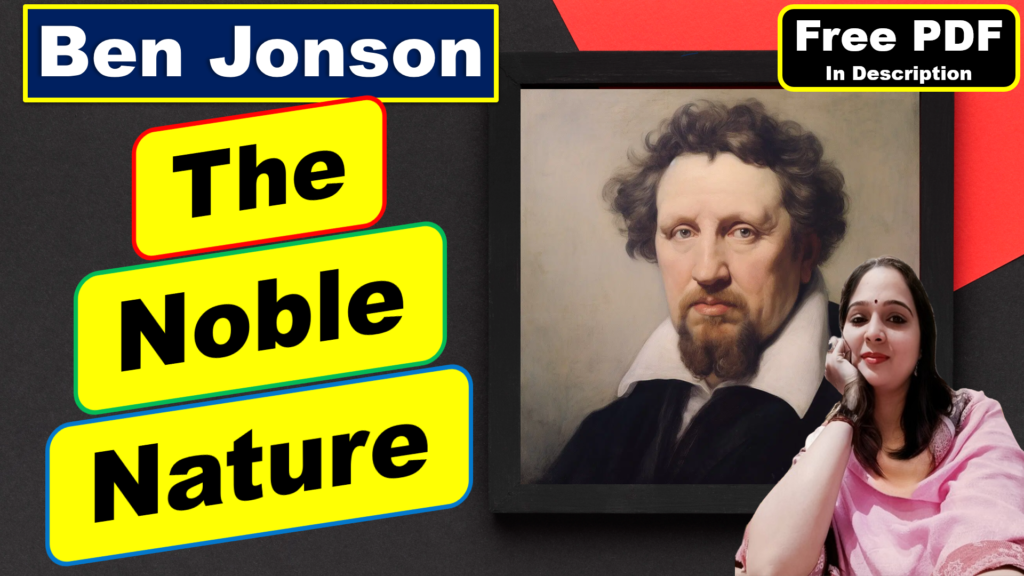
The Noble Nature by Ben Jonson Analysis
It is not growing like a tree
In bulk, doth make man better be;
Explanation
The poem opens with a challenging thought: physical size or longevity do not define good character. Merely growing like a tree, towering in stature, isn’t enough to make someone a better person.
Poetic devices
Metaphor: The poet uses a tree as a metaphor for a man who grows in size or quantity.
Alliteration: The repetition of the ‘b’ sound in “bulk” and “better” creates alliteration
Or standing long an oak, three hundred year,
To fall a log at last, dry, bald, and sere:
Explanation
Even living for an impressive 300 years like an oak isn’t enough. If one hasn’t cultivated inner virtue or found meaning, they eventually become a lifeless log, devoid of purpose.
Poetic devices
Symbolism: The oak tree symbolizes longevity and endurance.
Imagery: The poet creates a vivid image of an oak tree standing for three hundred years, only to fall and become a dry, lifeless log.
A lily of a day
Is fairer far in May,
Explanation
The poem introduces a contrasting image: the ephemeral beauty of a “lily of a day,” a flower that blooms and fades within a single day. Even though it has a short lifespan, its peak beauty in May surpasses that of the aged oak.
Poetic devices
Metaphor: The lily is used as a metaphor for a man’s life.
Imagery: The poet creates a vivid image of a lily blooming beautifully in May and dying the same night.
Although it fall and die that night—
It was the plant and flower of Light.
Explanation
Even though the lily blooms for only a day, it lived its short life with radiant beauty and purpose. It was a “plant and flower of Light,” symbolizing virtue and meaning.
Poetic devices
Metaphor: “plant and flower of Light” – symbolizes the lily’s virtue and meaningfulness.
In small proportions we just beauties see;
in short measures life may perfect be.
Explanation
The poem concludes with a powerful message: true beauty and perfection can be found in small things and short lives. If lived with purpose and virtue, even a brief life can be fulfilling and meaningful.
Poetic devices
Alliteration: The repetition of the ‘s’ sound in “small”, “see”, “short” and ‘m’ sound in “measures” and “may” creates alliteration
The Noble Nature by Ben Jonson Summary
“The Noble Nature” is a poem by Ben Jonson, an English playwright, poet, and contemporary of William Shakespeare. In this poem, Jonson reflects on the nature of personal growth, emphasizing that the true essence of nobility is not determined by physical size or longevity.
The poem begins by rejecting the idea that physical growth, like that of a tree, necessarily makes a person better. Jonson argues that a man’s worth is not determined by the bulk of his stature or the length of his existence. He uses the metaphor of an oak tree that stands for three hundred years only to fall as a dry, bald, and withered log. This image conveys the idea that mere physical existence or endurance does not guarantee true nobility or worth.
Jonson then contrasts this with the ephemeral beauty of a lily that blooms for just one day in May. Despite its short-lived nature, the lily is described as fairer, representing the plant and flower of light. This imagery suggests that true beauty and nobility are found in qualities beyond physical appearance or longevity.
The poem concludes with the idea that genuine beauty and nobility are best appreciated in small proportions and short measures. In other words, it’s not the quantity or duration of one’s life that matters most, but the quality of one’s actions and character. Jonson encourages the reader to recognize that perfection in life can be achieved in modest and concise experiences.
Overall, “The Noble Nature” encourages a reevaluation of traditional notions of nobility and suggests that true worth is found in the intangible qualities of character and virtue rather than in physical attributes or the passage of time.
Key Points
Author: Ben Jonson (originally Benjamin Jonson) was an English playwright, poet, and literary critic of the seventeenth century. His artistry exerted a lasting impact upon English poetry and stage comedy.
Form: The structure of “The Noble Nature” by Ben Jonson consists of five rhymed couplets. Each couplet is a pair of lines, and the poem has a total of ten lines. The rhyme scheme is AABBCCDDAA, indicating that the first and second lines of each couplet rhyme with each other, and this pattern is maintained throughout the poem. The consistent rhyme scheme contributes to the poem’s musicality and formality.
Speaker: The speaker in the poem is the poet himself, Ben Jonson.
Setting: The setting of the poem is not explicitly stated, but the use of nature imagery suggests an outdoor setting.
Theme: The theme of the poem is the concept of nobility and beauty. The poem suggests that these qualities are not about size or longevity, but about quality and impact.
Plot: The poem does not tell a story, but it describes a fact in a very simple and direct way.
Tone: The tone of the poem is philosophical and reflective.
Style: The style of the poem is simple and direct. The poet uses metaphors and imagery of nature to convey his message.
Message: The message of the poem is that the little things make a much bigger and deeper impact than larger things. The poet talks about how making small improvements matter rather than trying to become something completely different all at once.
Word Meaning
| Line | Tough Word | Meaning in English | Meaning in Hindi |
| 2 | Bulk | Mass, Size | बड़ा |
| 2 | Doth | Does | करता है |
| 3 | Oak | a type of tree known for its strength and longevity | बलूत |
| 4 | Log | A section of the trunk of a tree | लट्ठा |
| 4 | Bald | Without hair | गंजा |
| 4 | Sere | Withered, dry | सूखा हुआ |
| 5 | Lily | A type of flower | कुमुदिनी |
| 6 | Fairer far | More beatiful | कहीं अधिक सुंदर |
| 7 | Although | Even though | हालांकि |
| 7 | Fall | To drop or descend freely | गिरना |
| 9 | Proportions | Relative size or extent | अनुपात |
| 9 | Beauties | Beautiful qualities | सुंदरताएँ |
| 10 | Measures | Amounts, quantities | माप |
| 10 | Perfect | Complete, flawless | पूर्ण |





